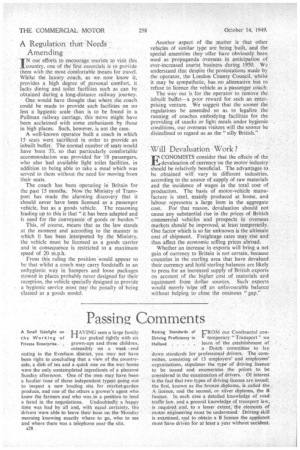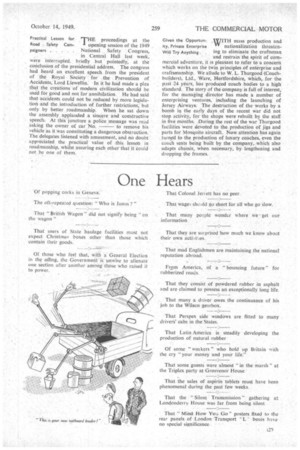Will Devaluation Work ?
Page 30

Page 31

If you've noticed an error in this article please click here to report it so we can fix it.
-ENCONOMISTS consider that the effeets of the , 1-1 devaluation of currency on the motor industry should be relatively beneficial. The advantages to be obtained will vary in different industries, according to the source of supply of raw materials and the incidence of wages in the total cost of production. The basis of motor-vehicle manufacture is steel, mainly produced at home, and labour represents a large item in the aggregate cost. For that reason, devaluation should not cause any substantial rise in the prices of British commercial vehicles and prospects in overseas markets should be improved, at least temporarily. One factor which is so far unknown is the ultimate cost of shipment Freightage rates may rise and thus affect the economic selling prices abroad.
Whether an increase in exports will bring a net gain of currency to Britain is not certain, because countries in the sterling area that have devalued their currency and hold sterling balances are likely to press for an increased supply of British exports on account of the higher cost of materials and equipment from dollar sources. Such exports would merely `wipe off an unfavourable balance without helping to close the ominous "gap.".
Practical Lesson for Road Safety Cam paigners
THEproceedings at the opening session of the 1949 National Safety. Congress, in Central Hall last week, were interrupted, briefly but pointedly, at the conclusion of the presidential address. The congress had heard an excellent speech from the president of the Royal Society for the Prevention of Accidents, Lord Llewellin. In it he had made a plea that the creations of modern civilization should be used for good and not for annihilation. He had said that accidents could not be reduced by more legislation and the introduction of further restrictions, but only by better roadmanship. When he sat down the assembly applauded a sincere and constructive speech. At this juncture a police message was read
asking the owner of car No. to remove his vehicle as it was constituting a dangerous obstruction. The delegates listened with amusement, and no doubt appreciated the practical value of this lesson in roadrnanship, whilst assuring each other that it could not be one of them.
Given the OpportunSJ1TH mass production and ity, Private Enterprise nationalization threatenWill Try Anything. . ing to eliminate the craftsman and restrain the spirit of corn, mercial adventure, it is pleasant to refer to a concern which works on the twin principles of enterprise and craftsmanship. We allude to W. L. Thurgood (Coachbuilders), Ltd., Ware, Hertfordshire, which, for the past 24 years, has produced coach bodies to a high standard. The story of the company is full of interest, for the managing director has made a number of enterprising ventures, including the launching of Jersey Airways. The destruction of the works by a bomb in the early days of the recent war did not stop activity, for the shops were rebuilt by the staff in five months. During the rest of the war Thurgood facilities were devoted to the production of jigs and parts for Mosquito aircraft. Now attention has again turned to the production of luxury coaches, even the coach seats being built by the company, which also adapts chassis, when necessary, by lengthening and dropping the frames.




























































































